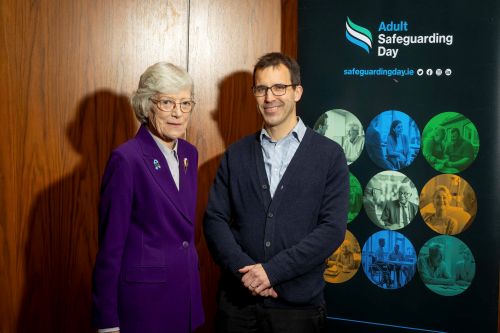Adult Safeguarding Day 2024 – 30% of adults have experience of Financial Abuse
- Date: Tue, Nov 12, 2024
Share this article
By Beth Gormley, Communications and PR Manager, UCD College of Business

Photo: Safeguarding Ireland Chairperson Patricia Rickard-Clarke and Professor Cal Muckley at Adult Safeguarding Day 2024
“Banks can better protect their customers at risk of financial abuse through AI and monitoring of customers' money management difficulties,” said Professor Cal Muckley, Chair in Operational Risk, Banking & Finance at UCD Michael Smurfit Graduate Business School.
“Financial abuse, a hidden epidemic, needs to be taken seriously.”
Almost a third of adults in Ireland have experience of Financial Abuse (30%) – with the vast majority (81%) of the abuse carried by someone well-known to the victim rather than online, or anonymously.
Professor Muckley was the key note speaker at Adult Safeguarding Day, a major annual public awareness drive of safeguarding Ireland which took place on November 8, 2024.
His recent research shows that AI based models using clinically informed lead indicators and data related to money management difficulties can predict clinical diagnosis of Alzheimer’s Disease and Related Dementias (ADRD) four years in advance.
These findings demonstrate that financial institutions with insight into the financial transactions of older customers are uniquely positioned to identify who might be in a vulnerable situation due to early-stage dementia. Financial institutions can use this data to enhance their protection of customers with dementia and to inform the inter-generational transfer of financial control to a reliable agent. Read more here.
Professor Muckley presented at the Collaborating and Innovating to Prevent Financial Abuse seminar which brought together private sector, civil society, legislators and policymakers to explore financial abuse and adult safeguarding and to consider key current challenges and opportunities in preventing financial abuse. The event is an initiative of Safeguarding Ireland, and supported by the HSE, in partnership with organisations across the health, social, financial and justice sectors.
In new RED C research on Financial Abuse – 11% of adults surveyed said they had personally experienced financial abuse, while 20% said they were aware of someone else who had suffered this abuse.
Among those who had personally experienced financial abuse, 85% of the abuse situations were identified as involving a person known to them, while among those who had witnessed financial abuse the abuser was known in 78% of instances (the level was 81% combining both cohorts). A known person includes a family member, a carer, a neighbour, social welfare Agent, or worker. The RED C research involved a national representative sample of 1,000 adults.
Safeguarding Ireland Chairperson Patricia Rickard-Clarke said financial abuse is particularly prevalent among older people who are frail and also people with an intellectual or physical disability, an acquired brain injury, or mental challenge.
“While the majority of people are honest, it has been estimated internationally that one in ten people are dishonest in how they manage another person’s money, property, or benefits.
“The RED C survey has clearly established that the vast majority of financial abuse is person-to-person. We know that it often involves coercion of a vulnerable person. It can happen when someone is dependent on another person for help, and that person subtly misuses their money. This can start small and escalate into serious crime, but all financial abuse at any level is wrongdoing and must be called out.
“The message for Adult Safeguarding Day is to encourage all adults – including those with decision-making and capacity challenges – to keep in control of their own money as much as possible, to be very careful about who to trust and to plan for the future.”
The most common instances of financial abuse among those who experienced or witnessed it were:
• Cash taken from around the house (60%)
• Change not given back or returned (57%)
• A bank card misused (54%)
• Property or possessions used without knowledge or agreement (49%)
• An online scam or fraud (48%)
• Online banking was misused (40%)
• Social welfare payments misused (40%)
• Undue pressure to change a property deed, Enduring Power of Attorney or Will (29%)
Ms Rickard-Clarke said Safeguarding Ireland’s message for Adult Safeguarding Day is:
• Avoid sharing a bank card and pin number, account number, or access to online banking
• If help is needed – first ask for advice from the bank, An Post or Credit Union
• If help is needed with day to day spending – choose carefully a highly trusted person and limit their access
• Ask for receipts
• Get monthly account statements
• Make an Enduring Power of Attorney.
HSE National Safeguarding Office General Manager Tim Hanly said financial abuse is a serious crime and he urged people to report it if they have concerns: “If there is a serious and immediate danger, call the Gardaí at 999 or 112".
“For an ongoing financial safeguarding issue contact the HSE Safeguarding Team. There are regional teams covering all areas of the country. See www.hse.ie/safeguarding or email safeguarding.socialcare@hse.ie.










